This article was co-authored by Rebecca Tenzer, MAT, MA, LCSW, CCTP, CGCS, CCATP, CCFP. Rebecca Tenzer is the owner and head clinician at Astute Counseling Services, a private counseling practice in Chicago, Illinois. With over 18 years of clinical and educational experience in the field of mental health, Rebecca specializes in the treatment of depression, anxiety, panic, trauma, grief, interpersonal relationships using a combination of Cognitive Behavioral therapy, Psychodynamic therapy, and other evidence-based practices. Rebecca holds a Bachelor of Arts (BA) in Sociology and Anthropology from DePauw University, a Master in Teaching (MAT) from Dominican University, and a Master of Social Work (MSW) from the University of Chicago. Rebecca has served as a member of the AmeriCorps and is also a Professor of Psychology at the collegiate level. Rebecca is trained as a Cognitive Behavioral Therapist (CBT), a Certified Clinical Trauma Professional (CCTP), a Certified Grief Counseling Specialist (CGCS), a Clinical Anxiety Treatment Professional (CCATP), and a Certified Compassion Fatigue Professional (CCFP). Rebecca is also a member of the Cognitive Behavioral Therapy Society of America and The National Association of Social Workers.
There are 14 references cited in this article, which can be found at the bottom of the page.
This article has been viewed 38,615 times.
Depression takes on many forms, and sometimes it can be hard to spot. Many depressed people continue to perform well at work, take care of their families, and spend time with their friends, hiding their real feelings the whole time. If you’re concerned that a family member or friend may be wearing a mask of false happiness, there are a few ways to identify underlying depression. First, look for changes in the person’s living habits, and notice small indicators of depression when you spend time with them. Next, talk to them about whether everything is okay in their life.
Steps
Spotting Changes in Habits
-
1Notice whether the person’s eating habits have changed. Many people who are depressed start eating more or less than usual. They may also start making uncharacteristic choices about which foods to eat.[1]
- For example, if someone who usually cooks healthy meals starts living on a diet of convenience food, they may be depressed.[2]
- If you don’t see what your friend or family member eats on a regular basis, pay attention to changes in their weight, which can indicate over- or undereating.
-
2Pay attention if they complain about being tired all the time. Someone who is depressed might sleep much more than usual or be unable to sleep. They might also feel constantly exhausted, no matter how much sleep they get.[3] [4]
- Some indirect signs of this may be that they can't get to work or school on time, or if when you have plans in the evening they often leave early because they are tired.
- Depression can cause both physical and mental fatigue.
Advertisement -
3Look for changes in their social habits. Withdrawing from friends and family is a worrisome sign, even if the person still appears happy on the outside. If the person you’re concerned about has started spending significantly more time alone lately, it could be a red flag indicating depression.[5]
- For example, a depressed person might spend an increasing amount of time locked in their bedroom, avoid going out with friends, and stop having lunch with coworkers. They may stop responding to your texts or calls and may turn you down if you try to make plans with them.
-
4Notice self-medicating behaviors. Someone with depression may use substances or activities to numb their feelings. Keep an eye on your friend or family member and notice if any of their habits, such as drinking or shopping, are becoming excessive. This could indicate that they’re using the behavior as a coping strategy.[6]
- Behavioral signs of drug or alcohol abuse include: neglecting responsibilities at school or work, unexplained financial issues, secretive or suspicious behavior, sudden change in friends, mood swings, sudden change in personality, lack of motivation, appearing "spaced out" or hyperactive, paranoia, anxiety.[7]
- Physical signs of drug or alcohol abuse include: bloodshot eyes, change in sleeping habits, sudden weight loss or gain, deterioration of physical appearance, tremors, slurred speech, impaired coordination.[8]
Spotting Signs of Depression in Interactions
-
1Notice whether the person makes excuses. Depression can cause uncharacteristic behaviors that sufferers try to cover up with excuses. If your friend or family member is always explaining something away, such as the scratches on their arms or the reason they didn’t show up to a meeting, they may be hiding depression.[9]
- The person may become defensive when you challenge their excuses.
-
2Notice any unusual changes in mood. If your friend or family member has been lashing out in annoyance more than usual lately, or if they start crying without much provocation, pay attention. Depression can cause someone to lose control over their negative emotions.[10] However, depression can also cause a person to feel numb. If the person's emotions seem dulled and they do not react with emotion when the should — such as joy at a friend's success or their favorite football team qualifying for the playoffs — this could be a sign of depression as well.
- Often, suppressed feelings re-surface in surprising or inappropriate ways.
- For instance, if your normally mild-mannered sibling starts cursing at a driver who took their parking spot, something may be wrong.
- Or if your normally animated friend seems subdued and doesn't get excited about the things they once loved, then they may be battling depression.
-
3Look for hints about their real feelings. Your friend or family member may say things that are a subtle cry for help, even if they’re too proud or ashamed to ask for support directly. They may also confess their feelings but try to take it back later, insisting they’re actually fine.
- For instance, if your friend breaks down one night and says they can’t handle their life anymore, but the next day tells you they were just overreacting, don’t be so quick to believe them.
- Depression can come and go in waves. Someone may reach out for help at a low point but no longer take their condition seriously when they feel a little better.
-
4Be alert for signs of abandonment issues. Depression may make your friend or family member act needier than usual. They might get very upset if someone cancels plans with them, or they might start texting you every day for reassurance that you still care about them.
- Depression is isolating, and it lowers a person’s self-esteem. The combination of these factors can leave a depressed person feeling desperate for company or convinced that everyone secretly dislikes them.
- The insecurity and self-doubt can lead to anxiety about the person's abilities at work, as a friend and/or partner, or simply about their worth as a human being. They may attach to you as a way to try to feel whole or complete.[11]
-
5Notice whether the person is unusually pessimistic. If your friend or family member constantly finds the negative in a situation, it might be depression talking. Pay attention to whether they make more cynical jokes than usual, are unusually critical, or anticipate things going wrong. They may not laugh much or even smile.[12]
Having a Conversation
-
1Ask gentle questions. Try to get the person to open up to you by asking non-intrusive questions about how they’ve been doing lately. Keep in mind that if they’ve been concealing their depression on purpose, they don’t want you to know they have it. Avoid putting them on the spot or asking questions that will make them uncomfortable.[15]
- For instance, don’t just ask them, “Do you think you have depression?” This will probably make them feel defensive.
- Instead, start by saying something like, “I haven’t seen much of you lately. Is everything going okay?”
- Don't feel like you need to cover everything in a single conversation. The person may not be ready to talk, and it may take several attempts before they open up.
-
2Pay close attention to what the person tells you. Even if they’re not ready to tell you everything, your friend or family member may decide to open up a little about what’s going on. You might need to read between the lines of what they say. Ask good follow-up questions to help the person feel comfortable telling you more.[16]
- For instance, if the person tells you they’re feeling overwhelmed at work, you might say, “That sounds pretty stressful. How is it affecting the rest of your life?”
- Be aware that they may not be ready to open up yet. Don’t push them to talk more than they’re comfortable with.
- Make sure you are responsive to any small show of progress or trust — thank them for sharing with you, and let them know you are available to talk whenever they feel comfortable.
-
3Empathize. Let the person know you hear what they are saying and you aren’t judging them. They may feel embarrassed or guilty about their depression. If you put them at ease with kindness and empathy, they will be more likely to be honest with you.[17] [18]
- If the person reveals that they’re having a hard time, avoid telling them that you know how they feel. Instead, say something like, “That sounds really tough,” or “I’m sorry you’re dealing with that.”
-
4Ask how you can help. Tell your friend or family member that you want to support them, and ask them what they need from you. Avoid giving advice, even if you think it would help.[19]
- Someone with depression might perceive advice as pushy or insulting, even if you don’t mean it that way. Instead, let them decide how much and what kind of help they want to accept.
- If they say they don’t need any help, let them know that you’ll still be there if they change their mind.
-
5Encourage the person to seek therapy. If your friend or family member admits that they are depressed or struggling, encourage them to see a counselor or therapist. Emphasize that visiting a mental health professional is an ordinary thing that many people do, and that they will feel better after they go.[20]
- You could say something like, “Would you be willing to talk to a counselor to put my mind at ease? I can help you make an appointment.”
- If they are discussing self-harm with an intent to follow through, it is best to advise them to seek help from a highly trained clinician who works with major depressive disorder, or to visit their nearest emergency room for a more detailed evaluation.
Expert Q&A
-
QuestionHow can you tell if someone is faking happiness?
 Rebecca Tenzer, MAT, MA, LCSW, CCTP, CGCS, CCATP, CCFPRebecca Tenzer is the owner and head clinician at Astute Counseling Services, a private counseling practice in Chicago, Illinois. With over 18 years of clinical and educational experience in the field of mental health, Rebecca specializes in the treatment of depression, anxiety, panic, trauma, grief, interpersonal relationships using a combination of Cognitive Behavioral therapy, Psychodynamic therapy, and other evidence-based practices. Rebecca holds a Bachelor of Arts (BA) in Sociology and Anthropology from DePauw University, a Master in Teaching (MAT) from Dominican University, and a Master of Social Work (MSW) from the University of Chicago. Rebecca has served as a member of the AmeriCorps and is also a Professor of Psychology at the collegiate level. Rebecca is trained as a Cognitive Behavioral Therapist (CBT), a Certified Clinical Trauma Professional (CCTP), a Certified Grief Counseling Specialist (CGCS), a Clinical Anxiety Treatment Professional (CCATP), and a Certified Compassion Fatigue Professional (CCFP). Rebecca is also a member of the Cognitive Behavioral Therapy Society of America and The National Association of Social Workers.
Rebecca Tenzer, MAT, MA, LCSW, CCTP, CGCS, CCATP, CCFPRebecca Tenzer is the owner and head clinician at Astute Counseling Services, a private counseling practice in Chicago, Illinois. With over 18 years of clinical and educational experience in the field of mental health, Rebecca specializes in the treatment of depression, anxiety, panic, trauma, grief, interpersonal relationships using a combination of Cognitive Behavioral therapy, Psychodynamic therapy, and other evidence-based practices. Rebecca holds a Bachelor of Arts (BA) in Sociology and Anthropology from DePauw University, a Master in Teaching (MAT) from Dominican University, and a Master of Social Work (MSW) from the University of Chicago. Rebecca has served as a member of the AmeriCorps and is also a Professor of Psychology at the collegiate level. Rebecca is trained as a Cognitive Behavioral Therapist (CBT), a Certified Clinical Trauma Professional (CCTP), a Certified Grief Counseling Specialist (CGCS), a Clinical Anxiety Treatment Professional (CCATP), and a Certified Compassion Fatigue Professional (CCFP). Rebecca is also a member of the Cognitive Behavioral Therapy Society of America and The National Association of Social Workers.
Clinical Therapist Signs of depression include loss of interest in activities, isolation without wanting to communicate or see loved ones, and apathy. You may also notice a change in eating or sleep patterns, weight gain or weight loss. Some people suffering from depression may use substances like alcohol to numb their feelings, or experience headaches and stomachaches. Lastly, negative thought patterns may develop with depression. All or nothing statements like “I can’t do anything right” or “I never do well at work” are all red flags.
Signs of depression include loss of interest in activities, isolation without wanting to communicate or see loved ones, and apathy. You may also notice a change in eating or sleep patterns, weight gain or weight loss. Some people suffering from depression may use substances like alcohol to numb their feelings, or experience headaches and stomachaches. Lastly, negative thought patterns may develop with depression. All or nothing statements like “I can’t do anything right” or “I never do well at work” are all red flags. -
QuestionHow can you tell if someone is hiding their pain?
 Rebecca Tenzer, MAT, MA, LCSW, CCTP, CGCS, CCATP, CCFPRebecca Tenzer is the owner and head clinician at Astute Counseling Services, a private counseling practice in Chicago, Illinois. With over 18 years of clinical and educational experience in the field of mental health, Rebecca specializes in the treatment of depression, anxiety, panic, trauma, grief, interpersonal relationships using a combination of Cognitive Behavioral therapy, Psychodynamic therapy, and other evidence-based practices. Rebecca holds a Bachelor of Arts (BA) in Sociology and Anthropology from DePauw University, a Master in Teaching (MAT) from Dominican University, and a Master of Social Work (MSW) from the University of Chicago. Rebecca has served as a member of the AmeriCorps and is also a Professor of Psychology at the collegiate level. Rebecca is trained as a Cognitive Behavioral Therapist (CBT), a Certified Clinical Trauma Professional (CCTP), a Certified Grief Counseling Specialist (CGCS), a Clinical Anxiety Treatment Professional (CCATP), and a Certified Compassion Fatigue Professional (CCFP). Rebecca is also a member of the Cognitive Behavioral Therapy Society of America and The National Association of Social Workers.
Rebecca Tenzer, MAT, MA, LCSW, CCTP, CGCS, CCATP, CCFPRebecca Tenzer is the owner and head clinician at Astute Counseling Services, a private counseling practice in Chicago, Illinois. With over 18 years of clinical and educational experience in the field of mental health, Rebecca specializes in the treatment of depression, anxiety, panic, trauma, grief, interpersonal relationships using a combination of Cognitive Behavioral therapy, Psychodynamic therapy, and other evidence-based practices. Rebecca holds a Bachelor of Arts (BA) in Sociology and Anthropology from DePauw University, a Master in Teaching (MAT) from Dominican University, and a Master of Social Work (MSW) from the University of Chicago. Rebecca has served as a member of the AmeriCorps and is also a Professor of Psychology at the collegiate level. Rebecca is trained as a Cognitive Behavioral Therapist (CBT), a Certified Clinical Trauma Professional (CCTP), a Certified Grief Counseling Specialist (CGCS), a Clinical Anxiety Treatment Professional (CCATP), and a Certified Compassion Fatigue Professional (CCFP). Rebecca is also a member of the Cognitive Behavioral Therapy Society of America and The National Association of Social Workers.
Clinical Therapist Alcohol, drugs, comfort food, and excessive internet use are a few of the most common ways people self-medicate their pain.
Alcohol, drugs, comfort food, and excessive internet use are a few of the most common ways people self-medicate their pain.
References
- ↑ Rebecca Tenzer, MAT, MA, LCSW, CCTP, CGCS, CCATP, CCFP. Clinical Therapist & Adjunct Professor. Expert Interview. 19 August 2020.
- ↑ https://www.ncbi.nlm.nih.gov/pmc/articles/PMC7084175/
- ↑ https://www.helpguide.org/articles/depression/depression-symptoms-and-warning-signs.htm
- ↑ Rebecca Tenzer, MAT, MA, LCSW, CCTP, CGCS, CCATP, CCFP. Clinical Therapist & Adjunct Professor. Expert Interview. 19 August 2020.
- ↑ https://www.sciencedirect.com/science/article/abs/pii/S0262885613001790
- ↑ https://www.psychologytoday.com/blog/addicted-brains/201208/addiction-self-medication
- ↑ https://www.helpguide.org/articles/addiction/drug-abuse-and-addiction.htm
- ↑ https://www.helpguide.org/articles/addiction/drug-abuse-and-addiction.htm
- ↑ http://www.wingofmadness.com/how-depression-may-affect-your-life/
- ↑ https://www.helpguide.org/articles/depression/depression-signs-and-symptoms.htm
- ↑ https://www.mentalhelp.net/blogs/the-intricate-ties-between-depression-and-insecurity/
- ↑ https://www.helpguide.org/articles/depression/depression-symptoms-and-warning-signs.htm
- ↑ Rebecca Tenzer, MAT, MA, LCSW, CCTP, CGCS, CCATP, CCFP. Clinical Therapist & Adjunct Professor. Expert Interview. 19 August 2020.
- ↑ Rebecca Tenzer, MAT, MA, LCSW, CCTP, CGCS, CCATP, CCFP. Clinical Therapist & Adjunct Professor. Expert Interview. 19 August 2020.
- ↑ https://www.helpguide.org/articles/depression/helping-someone-with-depression.htm
- ↑ https://www.helpguide.org/articles/depression/helping-a-depressed-person.htm
- ↑ http://au.reachout.com/helping-a-friend-with-depression
- ↑ Rebecca Tenzer, MAT, MA, LCSW, CCTP, CGCS, CCATP, CCFP. Clinical Therapist & Adjunct Professor. Expert Interview. 19 August 2020.
- ↑ https://psychcentral.com/blog/archives/2012/05/08/9-best-ways-to-support-someone-with-depression/
- ↑ https://thepsychologist.bps.org.uk/volume-22/edition-1/stigma-and-help-seeking
- ↑ Rebecca Tenzer, MAT, MA, LCSW, CCTP, CGCS, CCATP, CCFP. Clinical Therapist & Adjunct Professor. Expert Interview. 19 August 2020.
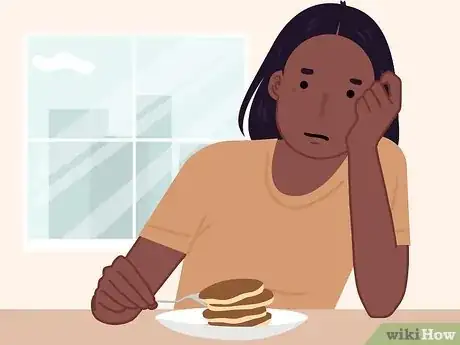




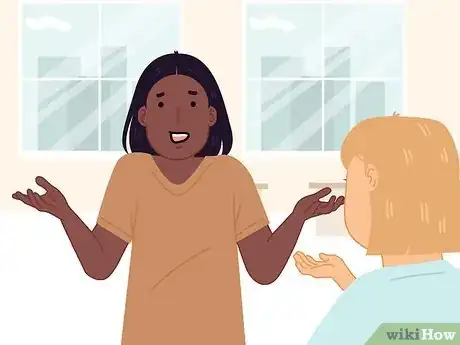
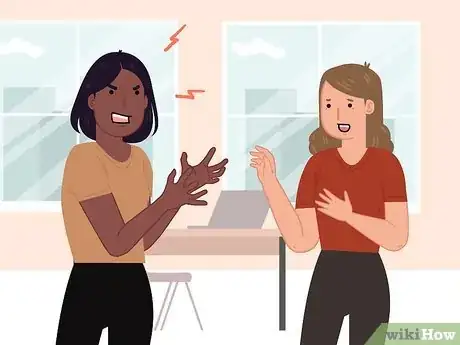
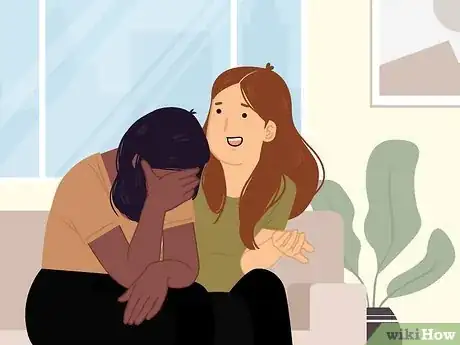



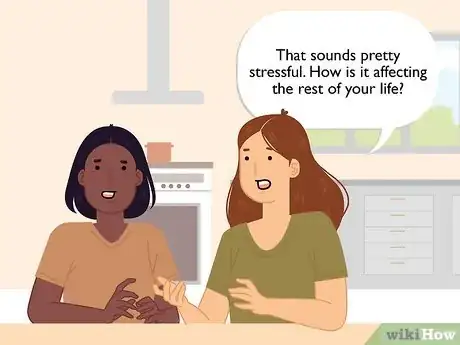
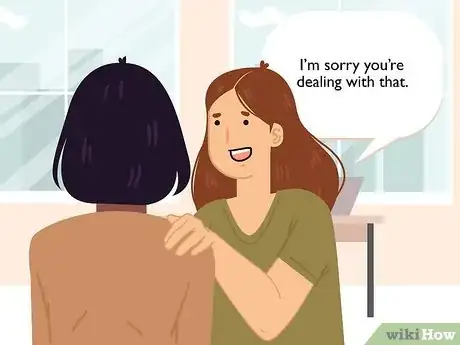
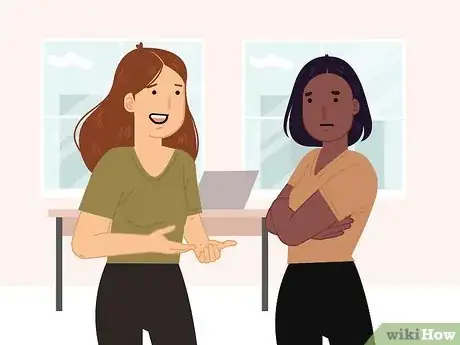

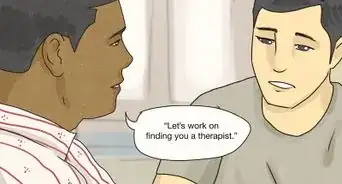



























































Medical Disclaimer
The content of this article is not intended to be a substitute for professional medical advice, examination, diagnosis, or treatment. You should always contact your doctor or other qualified healthcare professional before starting, changing, or stopping any kind of health treatment.
Read More...